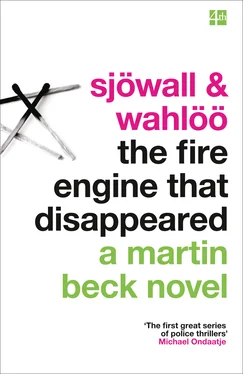The Fire Engine that Disappeared
MAJ SJÖWALL AND PER WAHLÖÖ
Translated from the Swedish by Joan Tate

This novel is entirely a work of fiction. The names, characters and incidents portrayed in it are the work of the author’s imagination. Any resemblance to actual persons living or dead, events or localities is entirely coincidental.
4th Estate
An imprint of HarperCollins Publishers Ltd. 1 London Bridge Street London SE1 9GF
www.harpercollins.co.uk
This ebook first published by Harper Perennial in 2007
This 4th Estate edition published in 2016
This translation first published by Random House Inc, New York, in 1971
Originally published in Sweden by P. A. Norstedt & Söners Forlag
Copyright text © Maj Sjöwall and Per Wahlöö 1969
Copyright introduction © Colin Dexter 2007
Cover photograph © Shutterstock
Maj Sjöwall and Per Wahlöö assert the moral right to be identified as the authors of this work
A catalogue record for this book is available from the British Library
All rights reserved under International and Pan-American Copyright Conventions. By payment of the required fees, you have been granted the non-exclusive, non-transferable right to access and read the text of this ebook on-screen. No part of this text may be reproduced, transmitted, down-loaded, decompiled, reverse engineered, or stored in or introduced into any information storage and retrieval system, in any form or by any means, whether electronic or mechanical, now known or hereinafter invented, without the express written permission of HarperCollins ebooks
HarperCollins Publishers has made every reasonable effort to ensure that any picture content and written content in this ebook has been included or removed in accordance with the contractual and technological constraints in operation at the time of publication
Source ISBN: 9780007242955
Ebook Edition © AUGUST 2009 ISBN: 9780007343492
Version: 2018-14-05
From the reviews of the Martin Beck series:
‘First class’
Daily Telegraph
‘One of the most authentic, gripping and profound collections of police procedural ever accomplished’
MICHAEL CONNELLY
‘Hauntingly effective storytelling’
New York Times
‘There’s just no question about it: the reigning King and Queen of mystery fiction are Maj Sjöwall and her husband Per Wahlöö’
The National Observer
‘Sjöwall/Wahlöö are the best writers of police procedural in the world’
Birmingham Post
Visit www.AuthorTracker.com for exclusive information on your favorite HarperCollins author.
Title Page
Copyright
Praise
Introduction
Chapter 1
Chapter 2
Chapter 3
Chapter 4
Chapter 5
Chapter 6
Chapter 7
Chapter 8
Chapter 9
Chapter 10
Chapter 11
Chapter 12
Chapter 13
Chapter 14
Chapter 15
Chapter 16
Chapter 17
Chapter 18
Chapter 19
Chapter 20
Chapter 21
Chapter 22
Chapter 23
Chapter 24
Chapter 25
Chapter 26
Chapter 27
Chapter 28
Chapter 29
Chapter 30
About the Authors
Other Books By
About the Publisher
Let me be completely honest from the outset. When I was invited to write the introduction to The Fire Engine that Disappeared , I somewhat guiltily realized that I had never read a single word written by Maj Sjöwall and Per Wahlöö. I had frequently read articles about the famous pair, and learnt from many knowledgeable critics that they were among the very finest writers of modern crime fiction. But such literature amounted to little more than books about the books, and not the books themselves; and with me, as with many others, the epithet ‘famous’ more often than not signifies ‘unread’.
Why was this?
I really ought to have been more kindly disposed towards the Swedes since they had been the very first nation to translate my own books; and from quite early on I had attended crime conferences in Stockholm and in Göteborg, where my most abiding memory is of the high price of alcohol. But the names of our two authors did not trip off the tongue with the easy familiarity of other foreign crime-writers, like Simenon or Dürrenmatt, and I got to read neither of them. A bigger factor, I am sure, was the view I’ve held for most of my life that the best definition of poetry is ‘what gets lost in translation’; and I have usually assumed (maybe correctly?) that ‘style’ in prose-writing also falls victim to the same potential malaise. And talking of translation and pronunciation, the reader of this novel must occasionally—surely!—feel a little intimidated by such topographical polysyllables as, for example, ‘Karlviksgatan is a street running from Norr Mälarstrand to Hantverkargatan, quite near Fridhemsplan’ (ch. 27). All a bit off-putting, isn’t it? But I took heart from the Sunday Telegraph quote for the blurb: ‘If you haven’t read Sjöwall and Wahlöö, start now.’ So I started, although with considerable clutter in my mind about what to expect.
My first preconception was that this husband-and-wife team, with a political stance well to the left, had become rather too bitterly critical in the sixties and seventies of what they saw as the betrayal of many of their Socialist ideas and ideals. My second was that their modus scribendi was deeply influenced by the 87th Precinct books of Ed McBain, with real-life crime found predominantly in cities rather than in sleepy English villages. Third, that during these same years, Sweden had become so liberal-minded about sex and sexuality that any sensitive soul might well have to be prepared for (or to hope for) a few paragraphs of explicit titillation.
Unexpectedly, it was none of these factors that struck me first. What struck me was the gently underplayed humour of the writing. Let me give some examples. An apartment building in Stockholm blows up spectacularly in the opening pages and is burnt to the ground. Melander is one of the investigating team, and the question of the cause of the fire was his particular headache, ‘apart from the fact that he had never had a headache’. Another of the team, and the hero of the rescue attempts, Gunvald Larsson, is being treated in hospital and being dressed in regulation clothing when we find him looking down at his feet ‘inserted into a pair of black, wooden-soled shoes, which either had been made for Goliath, or had been intended as a sign to hang outside some clog-maker’s’. One further example? ‘It took Martin Beck less than thirty seconds to open the door, which was considered a long time, as he had already got the key from the real-estate agent.’ All quite delightful.
Clearly then we are not going to be confronted by a couple of po-faced Marxists, and the first of my earlier preconceptions is in need of modification. What then am I now to say about any signs of disillusionment with those womb-to-tomb aspirations of what is unsympathetically termed the ‘nanny’ state? I found little or nothing in the novel that could be called tub-thumping propaganda. Instead, I came across a few rather muted and humane reflections on those laudable intentions which somehow had failed to materialize. As early as the first chapter, for example, Martin Beck, on a visit to his mother in an old people’s home, ‘walked past one of the dreary small sitting rooms in which he had never seen anyone sitting, and continued along the gloomy corridor’. All very gentle. Yet we do come across some bitter social commentary, albeit not given any third-person authorial imprimatur, but spoken by the discomfited mother of one of the villains: ‘It’s an accepted fact now that our reform schools and institutions act as a sort of introduction to drug-taking and crime. What you call treatment isn’t worth a cent.’ Pretty polemical!
Читать дальше













